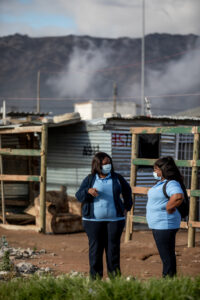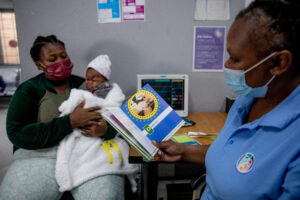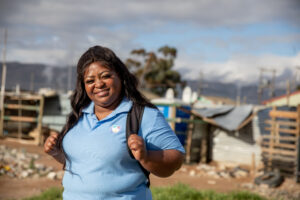Spotlight Series: Addressing The Growing Plight Of Noncommunicable Diseases

Mentor Mothers in the community they serve near Strand, South Africa.
Noncommunicable diseases (NCDs), such as diabetes, cardiovascular diseases, and cervical cancer, are a large and growing health threat for the communities mothers2mothers (m2m) serves. In fact, in sub-Saharan Africa, NCDs are expected to replace communicable (including HIV/AIDS and Tuberculosis), maternal, neonatal, and nutritional diseases, combined, as the leading cause of death by 2030. These diseases are prevalent in settings of marginalisation or poverty, and HIV infection increases the risk of many NCDs. For instance, the risk of cervical cancer increases up to six-fold for women who are living with HIV. As well as the risk to communities, the rising burden of noncommunicable diseases will also exert pressure on already-stretched health systems.
m2m’s next steps: noncommunicable diseases
The need to integrate education, support, treatment, and prevention for this growing disease burden is more urgent than ever. m2m’s evolution to a primary health care organisation means that we will be able to better integrate this disease area into the vital and life-changing work that Mentor Mothers are already delivering for their communities.

Mentor Mother Francina educating her client about diabetes.
Our increasing ability to offer clinical services will prove critical to success here. Our integrated teams of community health workers and allied health professionals (like nurses), can offer a one-stop service to clients that makes the work more effective and reduces the burden on stretched health systems. The peer-led nature of our services makes our team powerful change agents, able to both advise on, and show the way, to better health from a place of shared experience.
In particular, this work will centre around the following key pieces:
- Educating: Peer-led one-on-one education and support, as well as support for families and households through community groups and sessions.
- Screening: For women and their families in their home or at health facilities, such as cervical cancer screenings (including pap smears), blood pressure monitoring, and blood glucose testing.
- Referring and linking: Where needed, m2m connects clients to, and helps them navigate, clinical services.
Meet Millicent

Millicent, m2m Spokeswoman and community health worker in Strand, South Africa.
“I think it’s important for us to offer clients these additional integrated services as living with HIV increases the risk and likelihood of other diseases, like NCDs. Often, the facility clinical staff doesn’t have time to fully support clients who are experiencing NCD symptoms, and explain to them why and how they should be sticking to their treatment.
But as m2m Mentor Mothers, we can take the time to go over what diabetes and hypertension is, how to make a diet plan, the importance of physical activities, and what a healthy lifestyle looks like. So, it is very helpful to them—especially as peers in my community are increasingly experiencing high levels of diabetes and hypertension in particular. Since Mentor Mothers are here, at least there is someone to help them with the journey.”—Millicent Magwa, Community Mentor Mother Coordinator in South Africa.
Don’t forget to subscribe to our newsletter as we share more about our work in this area!






















